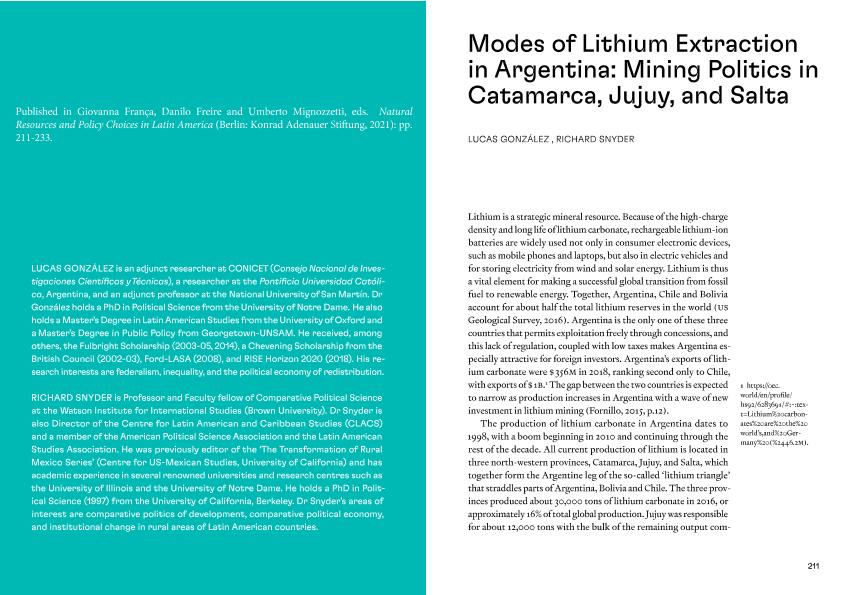Mostrar el registro sencillo del ítem
dc.contributor.author
Gonzalez, Lucas Isaac

dc.contributor.author
Snyder, Richard
dc.contributor.other
França, Giovanna
dc.contributor.other
Freire, Danilo
dc.contributor.other
Mignozzetti, Umberto
dc.date.available
2022-05-14T00:24:23Z
dc.date.issued
2020
dc.identifier.citation
Gonzalez, Lucas Isaac; Snyder, Richard; Modes of lithium extraction in Argentina: Mining politics in Catamarca, Jujuy, and Salta; Konrad Adenauer Foundation; 2020; 211-233
dc.identifier.isbn
978-65-990084-6-7
dc.identifier.uri
http://hdl.handle.net/11336/157541
dc.description.abstract
Lithium is a strategic mineral resource. Because of the high-charge density and long life of lithium carbonate, rechargeable lithium-ion batteries are widely used not only in consumer electronic devices, like mobile phones and laptops, but also in electric vehicles and for storing wind and solar energy. Lithium is thus a vital element for making a successful global transition from fossil fuel to renewable energy. Together, Argentina, Chile and Bolivia account for about half the total lithium reserves in the world (US Geological Survey 2016). Argentina is the only one of these three countries that permits exploitation freely through concessions, and this lack of regulation coupled with low taxes makes Argentina especially attractive for foreign investors. Argentina?s exports of lithium carbonate were $356M in 2018, ranking second only to Chile, with exports of $1B. The gap between the two countries is expected to narrow as production increases in Argentina with a wave of new investment in lithium mining (Fornillo 2015, p.12).Production of lithium carbonate in Argentina dates to 1998, with a boom beginning in 2010 and continuing through the rest of the decade. It is concentrated in three Northwestern provinces, Catamarca, Jujuy, and Salta, which together form the Argentine leg of the so-called "lithium triangle" that straddles parts of Argentina, Bolivia and Chile. Although these three Argentine provinces have shared historical roots, cultural traditions, socioeconomic profiles and political institutions as subnational units in a federal system, we observe striking variation both across and within them in the modes of lithium extraction, that is, in how mining projects articulate with local stakeholders, especially indigenous communities and organizations. In some mining projects, lithium extraction was unnegotiated, with mining companies imposing their preferred terms and conditions and making minimal concessions, if any, to local stakeholders. In such instances, the economic benefits of mining for nearby communities were minimal, and the environmental impact was usually large and negative. In other cases, by contrast, companies had to negotiate with local communities for mining to proceed. In these instances of what we call negotiated extraction, companies had to make concessions that improved some local socioeconomic indicators and mitigated environmental damage. Company concessions included providing local communities a guaranteed number of jobs, investments in public goods, monetary payments, and environmental monitoring. A third outcome, aborted extraction, resulted when companies decided to halt a project and withdraw from the production site because of large costs, usually stemming from organized resistance by local stakeholders. In these cases, conflict was often intense, the socioeconomic impact of mining on localities very limited, and environmental damage minimal. Why do some lithium mining ventures result in unnegotiated extraction whereas others result in negotiated or, alternatively, aborted extraction? To address this question, we focus on five mining projects across the three provinces. Together, these five projects encompass a wide range of extraction outcomes: Fénix, a longstanding instance of unnegotiated extraction located in the Salar del Hombre Muerto in Catamarca; Sales de Jujuy and Minera Exar, two cases of negotiated extraction located in the Salar de Olaroz-Cauchari in Jujuy, as well as AIS, a case of aborted extraction in Salinas Grandes-Guayatayoc, also in Jujuy; and, lastly, ADY, a recent case of unnegotiated extraction located in the Salar de Rincón in Salta. We discuss existing theoretical perspectives on resource extraction. We then describe the selected cases, focusing on cross-province variation in the role of state institutions in regulating lithium mining and also in the linkages between mining projects and local indigenous communities. We propose a typology of modes of extraction and explore the effects of different modes on local social conflict and economic conditions. The conclusion summarizes the main findings and considers comparative implications of the study.
dc.format
application/pdf
dc.language.iso
eng
dc.publisher
Konrad Adenauer Foundation
dc.rights
info:eu-repo/semantics/openAccess
dc.rights.uri
https://creativecommons.org/licenses/by-nc-sa/2.5/ar/
dc.subject
LITHIUM EXTRACTION
dc.subject
MINING POLITICS
dc.subject
ARGENTINA
dc.subject
FEDERALISM
dc.subject.classification
Ciencia Política

dc.subject.classification
Ciencia Política

dc.subject.classification
CIENCIAS SOCIALES

dc.title
Modes of lithium extraction in Argentina: Mining politics in Catamarca, Jujuy, and Salta
dc.type
info:eu-repo/semantics/publishedVersion
dc.type
info:eu-repo/semantics/bookPart
dc.type
info:ar-repo/semantics/parte de libro
dc.date.updated
2021-09-07T19:59:45Z
dc.journal.pagination
211-233
dc.journal.pais
Brasil

dc.journal.ciudad
San Pablo
dc.description.fil
Fil: Gonzalez, Lucas Isaac. Consejo Nacional de Investigaciones Científicas y Técnicas; Argentina. Pontificia Universidad Católica Argentina "Santa María de los Buenos Aires"; Argentina. Universidad Nacional de San Martín. Escuela de Política y Gobierno; Argentina
dc.description.fil
Fil: Snyder, Richard. University Brown; Estados Unidos. Center of Latin American and Caribbean Studies; Estados Unidos. American Political Science Association; Estados Unidos. Latin American Studies Association; Estados Unidos
dc.relation.alternativeid
info:eu-repo/semantics/altIdentifier/url/https://www.kas.de/en/web/energie-klima-lateinamerika/single-title/-/content/natural-resources-and-political-options-in-latin-america
dc.conicet.paginas
255
dc.source.titulo
Natural resources and policy choices in Latin America
Archivos asociados
